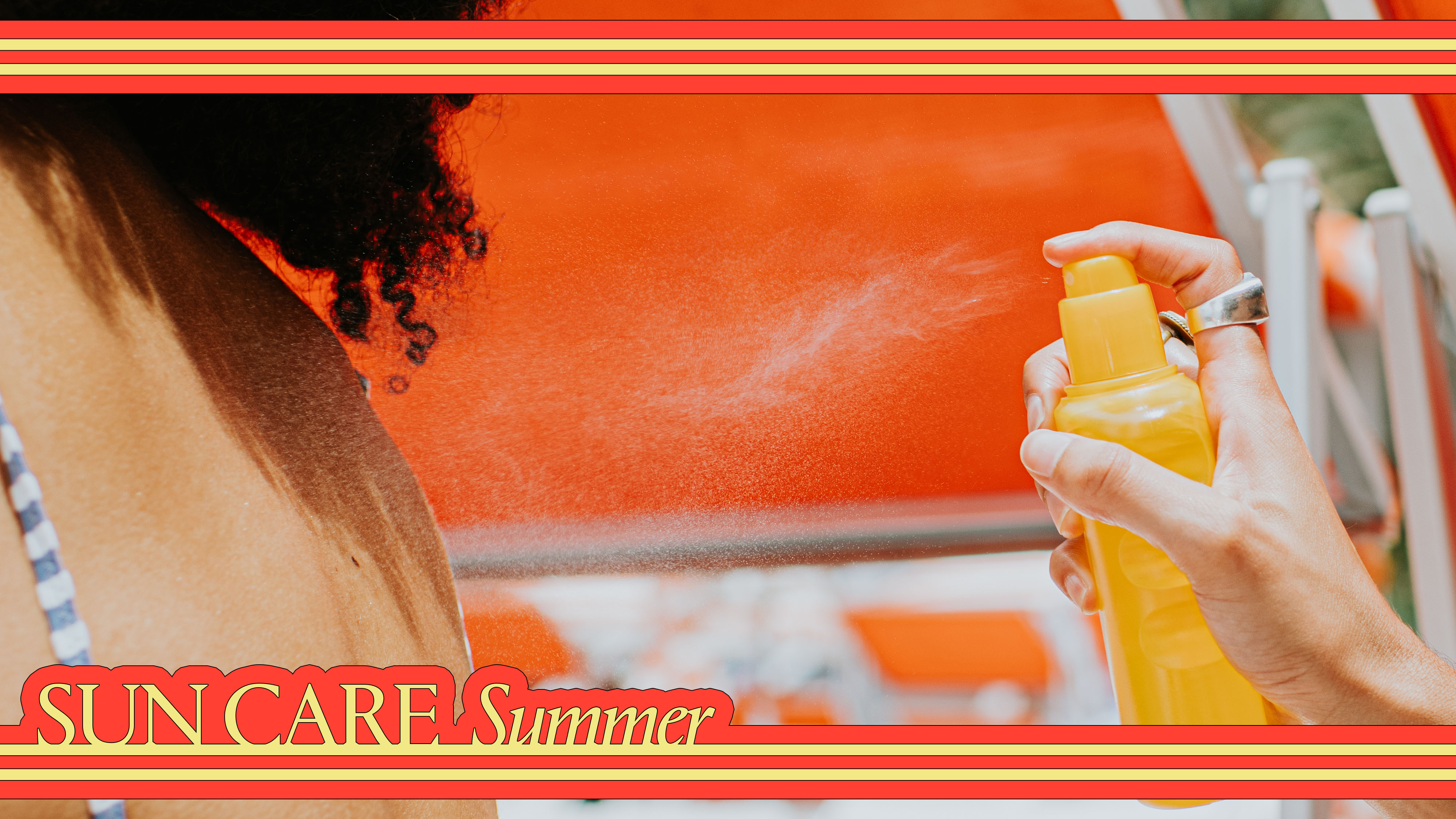Dermatologists Answer Your Burning Sun Care Questions, From Freckles to Applying SPF On Your Scalp
Our favorite hot topic—literally.


Select the newsletters you’d like to receive. Then, add your email to sign up.
You are now subscribed
Your newsletter sign-up was successful
Want to add more newsletters?

Delivered daily
Marie Claire Daily
Get exclusive access to fashion and beauty trends, hot-off-the-press celebrity news, and more.

Sent weekly on Saturday
Marie Claire Self Checkout
Exclusive access to expert shopping and styling advice from Nikki Ogunnaike, Marie Claire's editor-in-chief.

Once a week
Maire Claire Face Forward
Insider tips and recommendations for skin, hair, makeup, nails and more from Hannah Baxter, Marie Claire's beauty director.

Once a week
Livingetc
Your shortcut to the now and the next in contemporary home decoration, from designing a fashion-forward kitchen to decoding color schemes, and the latest interiors trends.

Delivered Daily
Homes & Gardens
The ultimate interior design resource from the world's leading experts - discover inspiring decorating ideas, color scheming know-how, garden inspiration and shopping expertise.
Sun protection is essential for any person with skin. So, everyone. Beyond the potential for skin damage, sun spots, wrinkles, and fine lines, sun exposure increases the risk of skin cancer, so much so that the CDC estimates one in five Americans will develop the disease in their lifetime. While the basics of sun safety are, well, basic—apply your SPF daily, re-apply, and seek shade from 10 a.m. to 2 p.m.—there’s a lot of sun care information that’s not so straightforward.
Like: Do my freckles mean I have sun damage, or am I just freckly? Why do I always get tan, even when I go through sunscreen at a rapid rate? Do I really need to apply sunscreen to my hair? These questions may seem flippant on their own, but the more we know about the sun and how it affects us, the better we can protect ourselves from the very real risks and damage that come with it.
To keep your skin safe this summer—through beach days, morning walks, and afternoons pouring back rosé—I sought out the best experts to answer Marie Claire readers’ most-requested sun damage and sun care questions. Here’s what they told me.
What Does an SPF Number Really Mean?
SPF stands for sun protection factor. The number indicates how long a product will protect your skin from sunburn compared to not wearing any sunscreen, according to Corey L. Hartman, MD, a board-certified dermatologist at Skin Wellness Dermatology in Birmingham, Alabama. In other words: SPF 30 will take 30 times longer for your skin to burn than if you weren’t wearing sunscreen, SPF 50 will take 50 times longer for your skin to burn than if you weren’t wearing sunscreen—you get it.
But there’s a catch. This logic only applies if you’re using enough sunscreen. The AAD recommends roughly a nickel-sized amount on your face and a full ounce (or a shot glass) on your body. If you skimp out on product, you’ll only receive a fraction of the reported sun protection factor.
Is a Higher SPF Always Better?
Those numbers are pretty important—a higher SPF can better protect the skin, help prevent skin cancer, and fight against photoaging (the premature aging of the skin due to ongoing sun exposure). At a minimum, you’ll want to use an SPF 30. After that point, the difference in sun protection isn’t particularly significant, says Ava Shamban, MD, board-certified dermatologist at Ava MD in Los Angeles. That being said, an SPF 50 provides 50 percent longer protection time before burning, which Dr. Hartman says makes it a good option for those spending extended periods of time in direct sunlight or those with highly reactive or sensitive skin.
But SPF isn’t the only factor you should look for when choosing a sunscreen. Dr. Hartman suggests using one that’s labeled as broad-spectrum, meaning it protects against both UVA and UVB rays. UVB rays primarily affect the outer layer of the skin, causing sunburns and contributing to the development of skin cancer, while UVA rays penetrate deeper into the skin, leading to long-term damage and visible signs of aging like wrinkles, loss of elasticity, and uneven pigmentation. By targeting both types of rays, broad-spectrum sunscreen provides fuller coverage and protection.
Get exclusive access to fashion and beauty trends, hot-off-the-press celebrity news, and more.
Do Chemical Sunscreens Absorb Into the Bloodstream?
This one’s a bit complicated. According to Teresa Song, MD, a board-certified dermatologist at Marmur Medical in New York City, some studies show “small systemic absorption” with certain chemical sunscreens filters like oxybenzone and avobenzone. This isn’t particularly surprising—given that chemical sunscreens protect against sun damage by absorbing UV radiation and converting it into more harmless forms of energy, like heat—but there hasn’t been any evidence to suggest that absorption is dangerous.
In fact, the FDA has noted that the presence of these chemical sun filters in the bloodstream is safe and that such findings “do not indicate that individuals should refrain from the use of sunscreen.” It’s worth noting that in the nearly 100 years chemical sunscreens have been available in the U.S., scientists have not found any long-term health issues caused by chemical sunscreen absorption.
“There is no definitive proof they’re unsafe,” Dr. Shamban says. “What we do know for sure is that sun damage and UVA and UVB rays are very dangerous. Skin cancer from the sun is prevalent, and melanoma in particular can be deadly. This is definitive.” According to the Skin Cancer Foundation, skin cancer is the most common cancer in both the U.S. and worldwide, with 1 in 5 Americans developing the disease by age 70.
If you’re particularly concerned, especially if you have sensitive skin or are pregnant, you can opt for mineral sunscreens, which have less likelihood of being absorbed into the bloodstream. Ultimately, the best sunscreen is one that you’ll use every day. Whatever you choose, don’t skip on sun protection.
In the nearly 100 years chemical sunscreens have been available in the U.S., scientists have not found any long-term health issues caused by chemical sunscreen absorption.
How Do I Reapply Sunscreen Without Messing Up My Makeup?
Thanks to an explosion of new SPF products and formats, it’s never been easier to reapply sunscreen without messing up your makeup. Spray and powder sunscreens are great options, since both can help boost sun protection while touching up your face beat.
If you’re not rocking a full face of makeup, you can gently tap a clear sunscreen stick or a traditional lotion into the skin. Regardless of your chosen method, try to apply the same amount of sunscreen as when you initially applied—a simple swipe or two won’t cut it.
How Do I Apply Sunscreen to My Scalp?
The skin on the scalp is just as susceptible to sunburn and skin cancer as skin on the rest of the body. In fact, Dr. Hartman says the scalp is such a forgotten area that it’s actually one of the more common places he finds skin cancer. And it’s worth noting scalp melanomas carry the highest mortality rate, with a 10-year survival rate of 60 percent.
For protection sans greasiness, Dr. Shamban suggests using a spray or powder sunscreen along the hair part and in any other bald or thinning areas. You can also gently massage sun lotion or a sunscreen oil into the skin around the scalp using the tips of your fingers, though it may leave behind a bit of a residue—think of it as part sun protection, part styling cream for the perfect slick back.
Are Freckles Proof of Sun Damage?
Freckles form from an overproduction of melanin (pigment produced from sun exposure), but they’re not necessarily a sign of skin damage; they’re hereditary. It’s normal for freckles to become more prominent, darker in color, or expand in size during sun exposure because they’re more sensitive to the sun. Even with every precaution, you can’t avoid sun exposure altogether.
That being said, if you notice exceptionally darker, larger freckles appearing within a couple of months or a year, take it as a note that you need to amp up protection.
Alcohol consumption makes skin more sensitive to the sun, increasing the risk of sunburn and damage.
Why Do I Get Tan Even With Sunscreen?
Genetics play a huge role in your skin’s ability to tan. Sunscreen isn’t perfect, and while it reduces UV penetration, it doesn’t block all of it. Some people are genetically prone to tan when in the sun, while others will burn.
Remember that while a golden tan might look nice, it's no different from a sunburn—tans are a sign of sun damage and inadequate protection. Unless it's a fake tan, of course.
Does Alcohol Impact My Risk of Sunburn?
Hold off on that extra margarita! Alcohol consumption makes skin more sensitive to the sun, increasing the risk of sunburn and damage. According to Dr. Song, the effect is twofold: alcohol dilates the blood vessels, widening them and allowing more blood to flow through; in turn, the skin is more sensitive, dehydrated, and vulnerable to UV harm. Alcohol-related inflammation can also slow down skin cell turnover and healing, leading to more intense, longer-lasting sunburns.
While sun exposure and alcohol consumption are not dermatologist-recommended pairings, you can do a few things to minimize the risk of damage. In addition to applying broad-spectrum sunscreen with an SPF 30 or higher, Dr. Shambam suggests alternating between an alcoholic beverage and a glass of cool water—you can even consider adding an electrolyte powder to boost hydration. Seek shade whenever possible, and avoid direct exposure during peak sun hours between 10 a.m. and 2 p.m. to the best of your abilities.
Do I Deed to Use SPF If I Have Dark Skin?
Let us repeat: If you have skin, you need sunscreen. SPF is for all skin types, tones, and ethnicities. “While it is true that darker skin provides some level of protection, it is only SPF five to SPF eight, which is minimal,” Dr. Hartman says. "Black skin can still be damaged by the sun.”
No matter your skin tone, it's also important to get a skin check every year by a board-certified dermatologist. Unfortunately, skin cancer in patients with darker skin tones often has a delayed diagnosis due to lower rates of skin surveillance and screening. According to the American Academy of Dermatology Association, sun damage and potential skin cancer in more melanated skin tones may appear as hyperpigmentation or melasma (dark spots and patches, especially on the face), sores that won’t heal or heal and return, chronically rough and dry patches of skin, and dark lines underneath or around fingernails or toenails. Should these signs not be professionally evaluated, it can lead to later-stage diagnoses and worse prognoses for patients with darker skin tones, per the Skin Cancer Foundation
You can find some of Marie Claire editors’ favorite SPFs for dark skin tones here—white cast-free protection, guaranteed.
SPF is for all skin types, tones, and ethnicities.
Does Sunscreen Cause Acne?
Sunscreen itself doesn’t cause acne. That being said, certain ingredients found in some sunscreens, like certain chemical filters as well as oils, silicones, and heavy emollients can trigger or exacerbate breakouts, particularly for those with acne-prone or oily skin.
To minimize the risk of breakouts, look for sunscreens with non-comedogenic, oil-free formulas. Gel-based and mineral-based SPFs are generally better suited for acne-prone skin. For an extra layer of protection, Dr. Hartman suggests applying acne medication (and giving it time to fully absorb) before applying sunscreen. (Some acne medications, like Aczone or Doxycycline, make the skin more susceptible to burning, so be sure to reapply sunscreen throughout the day.)
Finally, Dr. Hartman says not cleaning the skin properly after wearing sunscreen can also lead to breakouts. Be sure to thoroughly cleanse the skin for a full 60 seconds to ensure all sunscreen is properly removed.

Why Trust Marie Claire
For more than 30 years, Marie Claire has been an internationally recognized destination for news, fashion and beauty trends, investigative packages, and more. When it comes to the products Marie Claire recommends, we take your faith in us seriously. Every product that we feature comes personally recommended by a Marie Claire writer or editor, or by an expert we’ve spoken to firsthand.”
Meet the Experts

A native of New Orleans, Dr. Hartman attended Emory University graduating with a Bachelor of Arts in Psychology. After earning a doctorate of medicine from Meharry Medical College in Nashville, Tennessee, he completed an internship in Internal Medicine at Tulane University Medical Center and a residency in Dermatology at the University of Alabama School of Medicine. Dr. Hartman is certified by the American Board of Dermatology and is a fellow of the American Academy of Dermatology and the American Society for Dermatologic Surgery.
During his training, Dr. Hartman traveled to study at UCLA and Howard University, where he was an apprentice with experts in cosmetic procedures for all skin types. This knowledge has provided the basis for expertise in tailoring dermatologic surgery and cosmetic procedures that are safe and effective for patients from many diverse backgrounds.
Dr. Hartman has a special interest in Dermatologic Surgery, Injectables, Hair Restoration and Laser Dermatology. He frequently speaks on cosmetic procedures and social media marketing in dermatology at meetings around the country. His injectable skills have earned him the honor of being named an Allergan Advanced Injector Trainer and he is a speaker for Skinceuticals and Scientis, two leading skincare brands. In 2011, Skin Wellness Dermatology was honored with the Startup Business of the Year Award by the Birmingham Business Alliance. Dr. Hartman is a member of the Leadership Birmingham Class of 2014. Dr. Hartman was voted the 2016 Best of Birmingham: Dermatologist by the readers of Birmingham Magazine and the 2018 Best Dermatologist by the readers of About Town Magazine. Most recently in 2020, Dr. Hartman was named physician spokesman and brand ambassador for iconic Old Spice’s skin care lines for men. He also serves on the Advisory Boards for Men’s Health Magazine, Allergan Aesthetics, Galderma Aesthetics and Revision Skin Care. Most recently, Dr. Hartman was named to the Board of Directors of the Skin of Color Society.
Since 2016, Dr. Hartman has served as preceptor at his alma mater, the UAB School of Medicine Department of Dermatology. Cosmetic instruction for third-year residents comes directly from Dr. Hartman and Skin Wellness Dermatology. This prestigious honor reflects the trust and confidence in Dr. Hartman’s cosmetic dermatology skills as well as his commitment to the current and future community of dermatology.
Dr. Hartman is committed to the Birmingham community through his membership in Sigma Pi Phi Fraternity, Board of Directors of the Oasis Counseling Center and the Oakworth Capital Bank Central Alabama Advisory Board. He lives in Homewood with his wife, Dr. Erika B. Hartman and their children, Grant and Helen. When he’s not in the office he enjoys tennis, traveling, exploring new cultures and spending time with family and friends.

Dr. Teresa Song is a board-certified dermatologist with a clinical interest in both general and cosmetic dermatology. Aside from managing complex medical dermatology, she also has expertise in a wide array of aesthetic procedures including neuromodulators, fillers, platelet-rich plasma, laser devices, radiofrequency microneedling, chemical peels, body contouring, and more. Her clinical passion includes biostimulatory procedures that enhance and boost the patient’s own natural reserves, as well as inflammatory skin disorders such as eczema and alopecia. Dr. Song also enjoys managing pediatric skin conditions and serves as a clinical instructor at Mount Sinai Hospital Dermatology residency.
Dr. Teresa Song graduated Summa Cum Laude from The Sophie Davis School of Biomedical Education, now known as the CUNY School of Medicine at City College, where she completed a prestigious accelerated BS/MD combined 7-year program, in partnership with SUNY Downstate Medical College in Brooklyn. She was awarded The Dean’s Award of Academic Excellence for having the highest academic achievement among her class. She completed her undergraduate training with a major in Biomedical sciences and a minor in psychology. During her early medical school years, she was involved in pharmacological research on studying the anti-inflammatory and cancer-preventing effects of NOSH-aspirin. She was awarded multiple fellowships during medical school where she was able to conduct research both locally and abroad, studying the signal transmission of pain receptors. She also worked in the academic center tutoring her peers on various subjects from biochemistry to microbiology. While at SUNY Downstate, she was awarded the Robert F. Furchgott Research Award for outstanding scientific merits in research and graduated with distinction in research. Prior to graduation, she took a fellowship year to study at the laboratory of Inflammatory Skin Diseases under the Dermatology Chair, Dr. Emma Guttman, at the Icahn School of Medicine at Mount Sinai. While there, Dr. Song explored the various mechanistic pathways of inflammatory diseases and was involved in various translational studies evaluating novel therapeutics. After medical school, Dr. Song completed her internship in Medicine at NYU Winthrop Hospital in Mineola, Long Island, and her dermatology residency at the Mount Sinai Hospital in NYC.
Dr. Song understands that while there is no perfection in life, there is always room for improvement. She seeks to incorporate this ideology in providing the best comprehensive care for her patients. Being trained in NYC by the complex and ever-changing population, Dr. Song excels at integrating all components of the patient’s biologic and environmental factors into optimizing a customized treatment plan for the patient. Aesthetically, she believes the philosophy that less is more and works alongside her patients to achieve their common goal.
Personally, having spent her elementary school years in China, and with her mom as an acupuncturist and traditional Chinese medicine practitioner, she is always reminded of the importance of balancing the natural state of the body through nutritional and mental health.
She believes that healthy skin comes from healthy minds and is ready to help her patients achieve their best skin.

Dr. Ava Shamban is a board-certified dermatologist who believes that appearance and self-esteem are one in the same. She dedicates herself to helping patients worldwide heal their skin to live happier lives. A California native, Dr. Ava graduated magna cum laude from Harvard University and earned her medical degree from Case Western Reserve University School of Medicine. She is currently a member of the ASDS, the AAD and serves on the editorial board for The Journal of Clinical and Aesthetic Dermatology. In addition to her practices in Santa Monica and Beverly Hills, Dr. Ava was also an Assistant Clinical Professor of Dermatology at the UCLA-Geffen School of Medicine. She lectures internationally and serves as a principal investigator on many clinical and FDA trials. She is the author of Heal Your Skin: The Breakthrough Plan for Renewal (Wiley, 2011), makes regular television appearances on CBS’s The Doctors and ABC’s Extreme Makeover, and is a frequently quoted health and beauty expert in magazines all over the world.

Danielle Cohen is a freelance beauty journalist with more than five years of industry experience and a lifetime of beauty obsession to boot. Her writing has appeared in Allure, Elle, Glamour, InStyle, Cosmopolitan, Air Mail Look, Well + Good, CR Fashion Book, Refinery29, and Byrdie, among others. When she’s not doling out SPF recommendations, you can find her sifting through celebrity blind items, working on the daily crossword, or walking her French bulldog, Rollo. Keep up with her on Instagram @daniellemcohen.